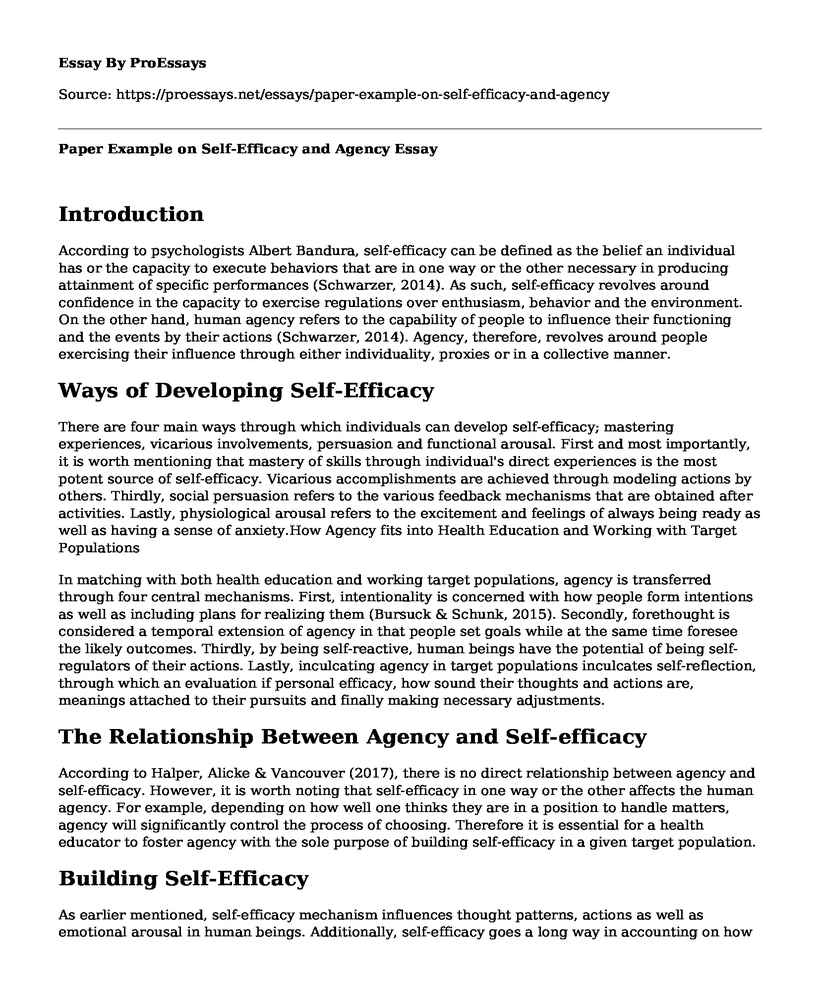Introduction
According to psychologists Albert Bandura, self-efficacy can be defined as the belief an individual has or the capacity to execute behaviors that are in one way or the other necessary in producing attainment of specific performances (Schwarzer, 2014). As such, self-efficacy revolves around confidence in the capacity to exercise regulations over enthusiasm, behavior and the environment. On the other hand, human agency refers to the capability of people to influence their functioning and the events by their actions (Schwarzer, 2014). Agency, therefore, revolves around people exercising their influence through either individuality, proxies or in a collective manner.
Ways of Developing Self-Efficacy
There are four main ways through which individuals can develop self-efficacy; mastering experiences, vicarious involvements, persuasion and functional arousal. First and most importantly, it is worth mentioning that mastery of skills through individual's direct experiences is the most potent source of self-efficacy. Vicarious accomplishments are achieved through modeling actions by others. Thirdly, social persuasion refers to the various feedback mechanisms that are obtained after activities. Lastly, physiological arousal refers to the excitement and feelings of always being ready as well as having a sense of anxiety.How Agency fits into Health Education and Working with Target Populations
In matching with both health education and working target populations, agency is transferred through four central mechanisms. First, intentionality is concerned with how people form intentions as well as including plans for realizing them (Bursuck & Schunk, 2015). Secondly, forethought is considered a temporal extension of agency in that people set goals while at the same time foresee the likely outcomes. Thirdly, by being self-reactive, human beings have the potential of being self-regulators of their actions. Lastly, inculcating agency in target populations inculcates self-reflection, through which an evaluation if personal efficacy, how sound their thoughts and actions are, meanings attached to their pursuits and finally making necessary adjustments.
The Relationship Between Agency and Self-efficacy
According to Halper, Alicke & Vancouver (2017), there is no direct relationship between agency and self-efficacy. However, it is worth noting that self-efficacy in one way or the other affects the human agency. For example, depending on how well one thinks they are in a position to handle matters, agency will significantly control the process of choosing. Therefore it is essential for a health educator to foster agency with the sole purpose of building self-efficacy in a given target population.
Building Self-Efficacy
As earlier mentioned, self-efficacy mechanism influences thought patterns, actions as well as emotional arousal in human beings. Additionally, self-efficacy goes a long way in accounting on how individuals adjust to changes in coping behavior including but not limited to levels of physiological stress and career pursuits (Brummert & Bussey, 2017). Building self-efficacy, therefore, revolves around seeking to practice personal resilience, observing resilient people, exercising self-control and vigorously pursuing encouragement and support of others.
References
Brummert Lennings, H. I., & Bussey, K. (2017). Personal agency in children: Assessing children's coping self-efficacy in the context of parental conflict. International Journal of Behavioral Development, 41(3), 432-443.
Bursuck, W. D., & Schunk, D. H. (2015). Self-Efficacy, Agency, and Volition: Student Beliefs and Reading Motivation. In Handbook of Individual Differences in Reading (pp. 72-84). Routledge.
Halper, L. R., Alicke, M., & Vancouver, J. B. (2017). Self-Efficacy. In The Self at Work (pp. 35-59). Routledge.
Schwarzer, R. (Ed.). (2014). Self-efficacy: Thought control of action. Taylor & Francis.
Cite this page
Paper Example on Self-Efficacy and Agency. (2022, Jun 10). Retrieved from https://proessays.net/essays/paper-example-on-self-efficacy-and-agency
If you are the original author of this essay and no longer wish to have it published on the ProEssays website, please click below to request its removal:
- The Effects of Music Therapy on the Cognitive Functions
- Eating Disorder in Mental Health Essay Example
- Essay Example on Artist Sam Gilliam's Mental Health Fight: A Case Study
- Essay on School: A Key to Success for Every Child in the US
- Paper Example on Understanding Health, Illness & Society: An Intro to Medical Sociology
- Essay Example on the Science of Aging: Exploring Gerontology and its Effects
- Psychological Stress in University Students: Causes & Effects - Essay Sample







